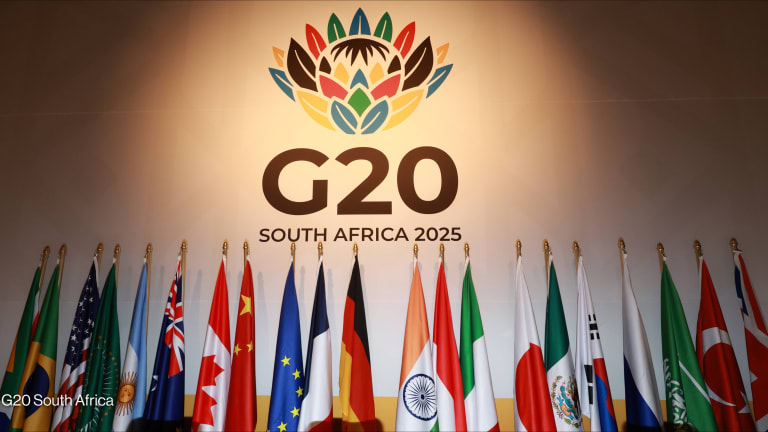
The World Bank is warning bluntly that sharp economic downturns will be the norm for many countries, as it slashed its economic growth projections and cautioned that things could get even worse.
The latest edition of the Global Economic Prospects report, released Tuesday, said a major concern is that stagflation — or high inflation combined with stagnant growth — will be particularly brutal for middle- and low-income countries.
“Several years of above-average inflation and below-average growth now seem likely,” bank President David Malpass told reporters. “For many countries, recession will be hard to avoid.”
More on food security:
► Why the food crisis might get worse before anything gets better
► Food prices up 37%, middle-income nations in crosshairs: World Bank
The food price crisis is especially concerning for the anti-poverty lender. “There is a severe risk of malnutrition and deepening hunger and even of famine in some areas, especially rural areas that are affected by conflict,” Malpass said, noting a sudden cutoff of grain supplies from the Black Sea after Russia invaded Ukraine earlier this year.
Growth forecasts for 70% of nations in the “emerging markets and developing economies” category were lowered since a previous prediction in January, and per capita income will be nearly 5% below the pre-COVID-19 trend in these countries, the bank said, meaning the poor are going to get poorer. The sole bright spots are largely in energy-exporting nations, such as in the Persian Gulf.
The global economy is now predicted to grow at 2.9%, down from the 4.1% projection in the previous report. Growth was 5.7% in 2021, which makes this the “sharpest deceleration” in a post-recession recovery in eight decades, with Russia’s invasion of Ukraine bearing a lot of blame. The bank said the ongoing risks suggest that growth next year could slow to as little as 1.5%.
Malpass said governments must take immediate action to reduce the harm being caused to everyday people and prevent stagflation from reigning for multiple years. He said that as Europe, in particular, pivots away from Russian food and energy toward other sources, this “makes new energy and food production an imperative for both Europe and the world.”
He urged nations to announce plans to increase their production, so as to give markets a signal and reduce price pressures battering the poor, for whom food makes up a larger portion of their spending. An International Monetary Fund estimate said that for people in low-income countries, food makes up nearly half of all consumption on average, compared with about 16% in advanced economies.
The food problem is made worse by the sky-high prices of fertilizers, which have doubled globally alongside rising fuel costs. This is causing reductions in crop yields — which, along with droughts and climate change, are adding to the pressure on food prices. Malpass called for a much faster transition to low-carbon energy sources.
The bank also called for more debt relief, even as Malpass conceded there has been no progress by major economies on a system for assistance to countries facing huge debt burdens, which are being exacerbated by rising interest rates and inflation.
“I expect there to be defaults and especially more strains on the payment system,” Malpass said in a call with reporters.
More on the debt crisis:
► Debt crisis worsens in poor countries, but no sign G-20 in a hurry
► World Bank says debt crisis in lower-income nations is 'alarming'
The bank’s latest report compares the current situation to the stagflation of the 1970s, which was followed by multiple debt crises. Notably, the bank expects global growth in the current decade to be below the average from the previous decade.
“This structural weakening would resemble the prolonged growth slowdown during the stagflation of the 1970s,” the report said, while noting key differences too, including an improvement in monetary policy frameworks.
Separately, IMF released a blog post with policy advice for countries facing high food and fuel prices. The main thrust of the post is that governments will have to allow domestic prices to adjust upward with international prices — what is known as a pass-through.
However, IMF urged governments to be careful as prices shoot up, “protecting vulnerable households affected by the increases.” This means authorities need a “nuanced” approach that considers the needs of the poorest, such as food and gas for cooking.
For countries with subsidies in place, IMF said these need to be revised over the medium term, adding that fuel subsidies in particular end up leading to increased consumption by the middle and upper classes while doing much less for the poor.
“Governments should also try to increase food supply by supporting production, avoiding stockpiling, and using food reserves when available. Where food security is at risk, direct distribution of staple foods may be necessary,” IMF said.
Malpass has been repeatedly urging countries to avoid export bans that affect the food supply, a protectionist policy that leads to shortages elsewhere and price shocks, saying at his latest press conference that these are “harmful and will directly lead to famine in certain areas.”








